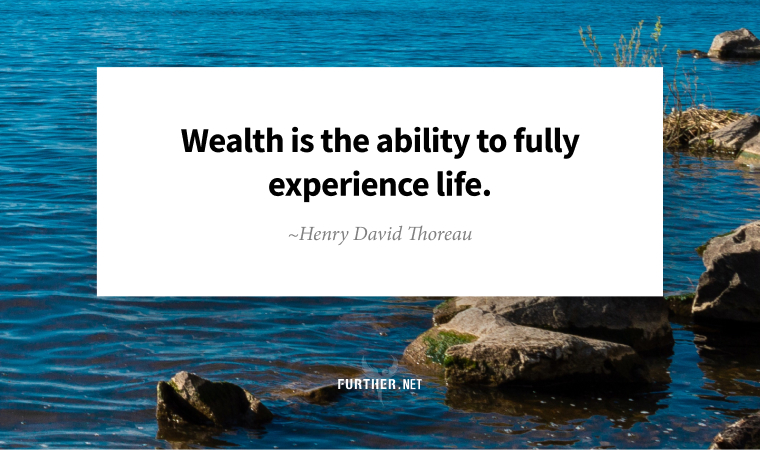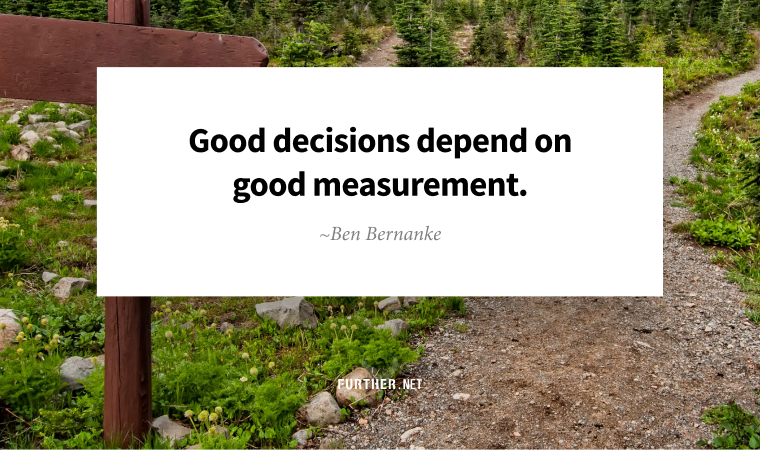
We’re leading the charge into the unknown. Or, at minimum, the uncertain.
That’s what Joseph Coughlin, author of The Longevity Economy, writes over at Forbes. And the subject is one that comes up around here at Further a lot — retirement.
Nearly two-thirds of us who joined the workforce in the 1980s, and everyone since then (this means you X’ers, Millennials, and Gen Z), are part of a grand experiment in retirement. The experiment began four decades ago with the disappearance of defined benefit plans, along with the financial certainty they offered, and the birth of promising, but less certain, defined contribution plans, e.g., 401(k)s.
In other words, we’re the first group staring down retirement who’ve never really had the option of a good ol’ fashioned pension. It’s been up to us to save for retirement, and keep our hands off through the dot-com crash, the Great Recession, and the COVID-19 pandemic — among other more mundane financial stressors.
But it’s more than that. Life expectancy has increased to the point that more than half of us will live to age 85. That’s not counting breakthroughs in longevity science, many of which promise not only to extend lifespan, but our healthspan as well.
It breaks down like this:
- You’ll likely live longer than your parents, but without a guaranteed pension
- You’ll hopefully avoid the typical crippling diseases of aging for longer
- ???
- You’ll be able to pay for all that viable extra life without working
Something tells me Step 3 is a bit mystifying to most. Coughlin says we’re all in the same boat there, going so far as to call us Generation U (for uncertainty). But there’s another “U” that comes to mind (and Coughlin recommends), and that’s unretirement.
It’s more than just working past 65. It’s about starting now to focus on increasing your wealthspan in an intentional way that allows for wealth in your elder years the way Thoreau meant: the “ability to fully experience life.”
So along with lifespan and healthspan, we’ve got to consider the key points of wealthspan:
- First up is meaningful work that fulfills a sense of purpose. Doing mindless grunt work just to scrape by is no way to spend your so-called golden years.
- Next, can you live wherever you want? Everything from the political strife, to the high cost of living, to climate change indicates that you don’t want to find yourself stuck in a location that’s become unfavorable.
- Finally, you have to be self-sufficient if you find yourself flying solo. More people than ever are living alone due to gray divorce or the loss of a spouse early mortality. You’ll need a setup where you can get the help you need when it comes time that you need it.
It can feel like the rug has been pulled out from under us just when it was our turn to retire. But here’s another perspective … retirement at age 65 was basically “invented” on August 14, 1935 when the Social Security Act came into being. Think about it that way and it looks more like that was the experiment that didn’t pan out.
None of the above even takes into account the impact artificial intelligence, automation, and robotics will have on the job market this decade. Things will get weirder from here, so buckle up.
I’m not telling you this to ruin your day. You know what’s up. Just also know that drastic change leads to outsized opportunity, and that’s where your head has to be at.
Who knows, the decisions you make today may become what you reflect on when expressing gratitude for the life you got to live from this point on. I’m still bullish on the prospects for the latchkey kids.
The Making Of Generation U and Why A New Model Of Retirement Advice Is Needed Now
Keep going-
P.S. New to Further? Join us here.
Reset Your Healthspan
Speaking of living better longer: “Researchers contend that new solutions for increasing health span lie at the intersection of regenerative medicine research, anti-senescent investigation, clinical care and societal supports.”
A Regenerative Reset for Aging
Green = Happy
Speaking of living anywhere you want: “[Researchers] found that happy places were often countries that consumed significantly but also eliminated waste, got their energy from sustainable sources, and minimized commutes.”
What the Happiest Countries in the World Can Teach Us About Green Living
Jump Around
The “jump to conclusions” mat in the film Office Space was the worst idea ever. And so is hasty thinking that leads to belief in conspiracy theories, overconfidence, and other mental errors.
People Who Jump to Conclusions Show Other Kinds of Thinking Errors
Hello Hawaii!
Speaking of jetting off to Hawaii (don’t tell me we weren’t speaking of that): According to Hawaiian Governor David Ige, “it is now safe for fully vaccinated residents and visitors to resume nonessential travel to and within the State of Hawaii.”
Hawaii Welcomes Tourists Back Starting in November
Use the Scoreboard Principle to Achieve Your Goals

By Trudi Roth
If you’re like me and 42% of American adults, one of the pandemic’s many downsides was “unwanted weight gain.” (Damn you, Great British Baking Show!) Given that obesity is a top risk factor for severe COVID-19 and takes a toll on healthspan, I finally got a grip by going back to the basics.
By logging my food and exercise, I quickly realized where I went astray and how to get back on track. Four months later, and I’m at my pre-pandemic weight and feeling much healthier overall.
Turns out there’s a psychological angle to using measurement to induce improvement. If you want to accomplish more, you’ve got to keep score.
The Scoreboard Principle
Benjamin Franklin wasn’t always the hero and iconic innovator he’s remembered being. In his early 20s, he was a heavy drinker, inveterate gossiper, and all-around randy guy. Franklin came up with a list of 13 virtues (i.e., temperance, silence, chastity) to counteract his bad habits and tracked his adherence to those standards in a daily journal. Clearly, his hard work paid off.
Franklin’s practice embodies the Scoreboard Principle, based on the idea that humans naturally pay more attention when a score is kept.
When we see our numbers surge, progress feels tangible, sparking satisfaction and pride. In contrast, seeing our metrics plummet generates disappointment, frustration, even shame. These emotional jolts are not trivial. They lend our actions psychic weight, leading us to work harder in pursuit of a higher score.
We humans respond to measurements because we’re wired with a number instinct. Our ancestors needed that sense to tell the difference between a lot of food and not enough— ensuring they pursued things that maximized their survival.
Today we’ve evolved somewhat, but we can still harness that numerically driven sense to improve performance and outcomes in all kinds of scenarios.
Fast-Track Your Progress
While tracking calories and workouts with an app is simple, it’s a bit more complex to quantify skills and goals for less tangible areas of improvement. Social scientist Ron Friedman Ph.D. recommends three approaches:
- Break a single activity into multiple subskills, and measure each task individually. For example, a presentation can be graded on content, memorization, and delivery.
- Critique your performance of a single skill. Tie metrics to the features of that one action. For example, if you want to write better memos, you can grade yourself on how well you grabbed attention, delivered facts, and ended strong.
- Take a holistic approach, assessing your ongoing performance according to standards you set. Logging progress is what Franklin did so effectively.
Self-improvement is personal, so others aren’t likely keeping score. But if you want to be the best version of yourself, maybe you should.
How to Benefit from the Scoreboard Principle (Psychology Today)
further: flashback
 The Church – Under The Milky Way
The Church – Under The Milky WayStarfish, 1988
Under the Milky Way reminds me of a club I frequented my junior year of college. The song was playing at midnight when I officially turned 21, so I sauntered up front — drink #3 already in hand — and got stamped as legal. Ah, the 80s. (YouTube)
further: sharing

Further subscribers earn $MOVE coin to get cool gear and special access to member-only resources simply by referring friends to join the newsletter. Get your own free weekly dose of health, wealth, travel, and happiness advice here.
Thank you for sharing Further!
